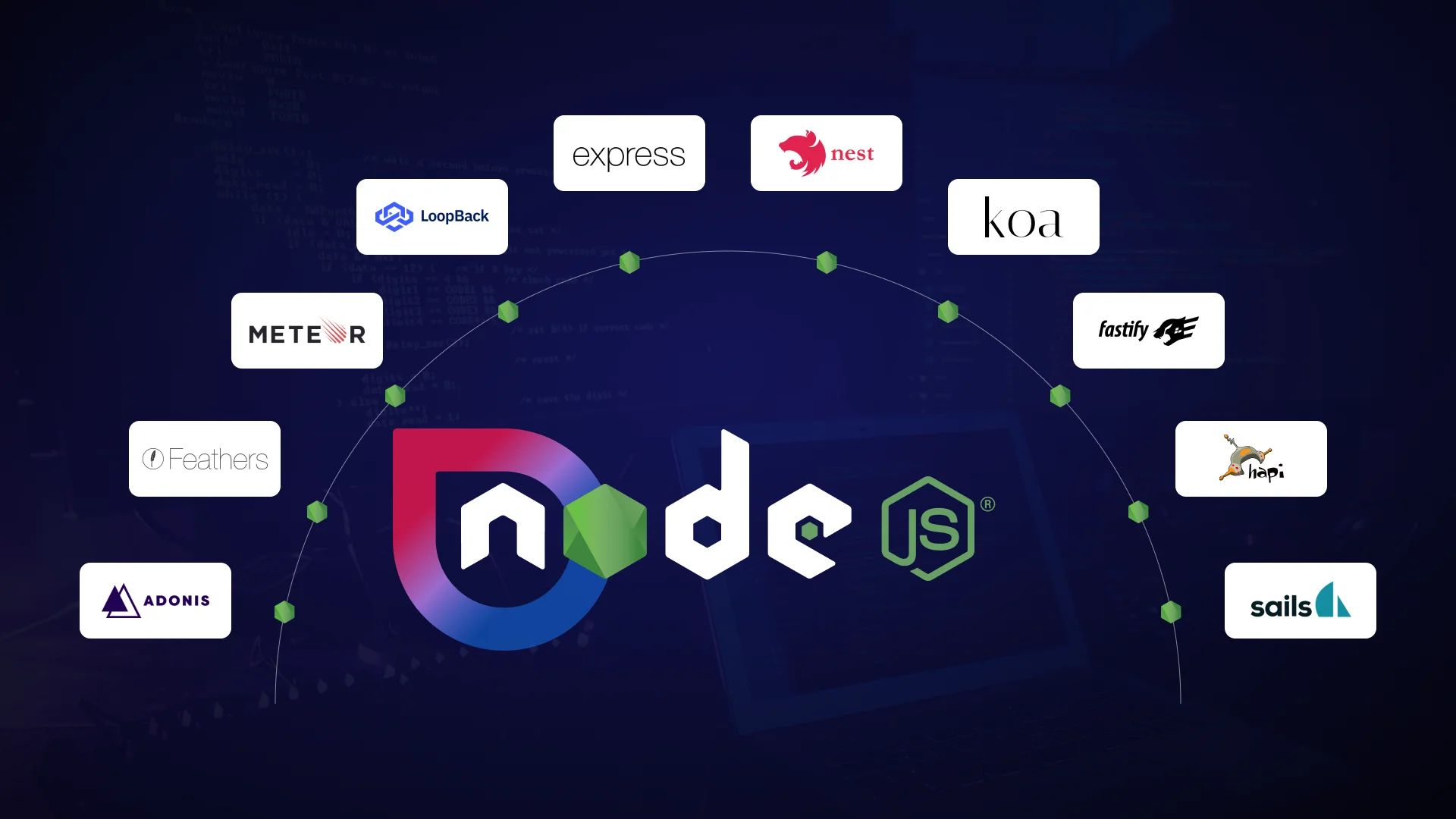Top 10 NodeJS Frameworks: Which One To Choose in 2025?
- Web
- June 17, 2024
Node.js frameworks play a crucial role in streamlining the web and API development process. Node.js offers a wide variety of frameworks, each with unique features and benefits. This blog lists some of the top Node.js frameworks, their features, and more that you can consider for your project.
One of the biggest challenges that web developers used to face before was the restriction of the JavaScript framework to enable client-side scripting only. While some server-side JavaScript frameworks existed before 2009, they were less common. Node.js, introduced in 2009, revolutionized web development by making it possible to use JavaScript for both client-side and server-side scripting, allowing developers to use a single language for the entire application stack.
The benefits were quick and exciting and Node.JS became the most advantageous environment for custom web development.
In this blog, you will get to know about the best Node.js frameworks that dominate web development depending on speed, ease of use, popularity, complexity, and community support.
Before discussing them, let’s have a brief idea of what a Node.js framework is!
Node.js Framework: In Brief
Popularly referred to as a framework, Node.js is technically a JavaScript runtime environment.

Node.js, along with the JavaScript frameworks built on it, offers pre-written code, tools, and libraries to developers, streamlining web development.
Like any web framework, the most crucial elements of a Node.js framework are its architecture and features, including security support, compatibility with other libraries, flexibility, and customization.
Additionally, there are various pros and cons of using Node.js for web development, which can only be fully realized by weighing these features against your specific web development requirements.
Top 10 Node.js Frameworks for Web Development
Now, let’s take your look at the top Node.js frameworks to dominate in 2025!
1. Express.js
Express is the only Node.js framework that uses a minimalist approach. It is a backend framework designed to be unopinionated, lightweight, and fast, making web application development efficient for developers due to its extensive ecosystem of plugins and middleware.
Key features of Express.js include:
- Powerful routing system
- Robust middleware support
- Templating engine (14+) support
- Error handling mechanism
- Serves static files
- Extensibility
- Built-in debugging capabilities
- Wide range of HTTP helpers
- Enhanced content negotiation
Express.js is the best-suited Node.js framework for developing complex web apps such as RESTful APIs, Single-Page Applications (SPAs), real-time apps (with Socket.io), middleware-rich apps, and more.
2. NestJS
NestJS is a progressive Node.js framework for developing scalable, reliable, and maintainable server-side apps. It leverages the capabilities of modern JavaScript and supports TypeScript.
Inspired by Angular and Spring, it offers a well-defined architecture that enhances code maintainability, particularly beneficial for large projects. It also facilitates scalability.
Key features of NestJS include:
- Built-in dependency injection system
- Utilizes decorators
- Incorporates event-driven architecture
- Rich Ecosystem of tools that facilitate customization
- Organizes apps into self-contained modules
Nest.js shines in building Enterprise-grade Applications, Isomorphic Applications, GraphQL APIs, Microservices Architecture, RESTful APIs, and apps with complex backends. Nest.js has been the framework of choice for giants like Adidas, Capgemini, Decathlon, Roche, BMW, Mercedes-Benz, IBM, and more.
3. Koa
Koa JS is an expressive HTTP middleware framework with a modular middleware architecture used by web developers to build APIs and web applications. Its minimal approach focuses on clarity, control, and efficiency in web development.
Apart from providing the flexibility to choose an appropriate middleware, Koa facilitates custom web application development or API development from the ground up using JavaScript.
The basic features of Koa JS are:
- A very small framework
- Support generators
- Simplifies error handling
- Provides a set of HTTP utility methods
- ES6+ Features
- Leverages async/await functionality (from ES2017)
Koa.js is a preferred framework when you are looking to develop microservices and APIs, RESTful APIs, SPAs, real-time apps, web servers, CMS, authentication systems or API gateways, and more. Companies like Paralect, Pier, Attio, airCloset, Shimo, and more have Koa.js in their tech stack.
4. Fastify
Fastify is considered one of the top Node.js frameworks for its speed, making it one of the fastest web frameworks available. According to benchmarks aimed at evaluating overhead, Fastify topped the charts with a score of 77,193 requests per second. This attests to its ability to handle a large volume of requests very quickly.
This relatively lightweight framework prioritizes developer experience by providing them with good documentation, clean and easy-to-use APIs, and more to help them get started with web development easily.
Here are some features of Fastify:
- Fully extensible( by using plugins, hooks, and decorators)
- Supports TypeScript
- Uses plugin-based architecture
- Provides schema-based request validation
- Built-in logging capabilities
- Built-in dependency injection mechanism
It is well-suited for projects where low latency, high concurrency, and minimal overhead are critical requirements. Therefore, it’s often preferred for developing real-time applications, microservices architectures, APIs, scalable apps, and other performance-sensitive web projects. From ClearGlass to Joggr, MR PORTER, Seedium, NearForm, Monitr, and more such organizations have Fastify as part of their technology stack.
5. Hapi
Hapi is a trustworthy and simple Node.js framework. It is to build REST (Representational State Transfer) APIs. Hapi provides an incredible capacity for building a server with great features like onPreHandler on a particular IP. This is why it is known as the most favorable option from Node js frameworks for the Node.js server framework.
Other features that make Hapi a suitable Node.js framework include third-party plug-ins support, authentication, caching, and I/O validation. The standout aspect of Hapi is its independence from external dependencies, offering completely centralized control over every line of code.
Some of the core Hapi.js features are:
- Built-in mechanisms for authentication, authorization
- Offers a flexible routing system
- Supports data validation using Joi
- Do not use middleware
- Provide extensibility model
- 100% code coverage across dependencies
- Facilitates an extensive set of official plugins
Though Hapi is primarily focused on developing scalable RESTful APIs, it can also be utilized for building microservices and proxy services. Companies like Brainhub, commercetools, Beam, Hy-Vee Aisles Online, Taggun, and more have reportedly used Hapi for their development needs.
6. Sails.js
Sails.js is another real-time MVC web development Node.js framework created on Express. It builds the latest, data-driven style of APIs and web apps. Sails.js can develop an API bookstore.
For instance, it provides some important blueprints, so you don’t require composing any code. Also, Sails is good with nearly all frontend technologies increasing from Windows Phone, Java or Android, Angular, React, and so forth.
Fundamental features of Sails.js include:
- Easy management of HTTP requests
- Assists Socket.io
- Compatible with frontend website building platforms
- Provides ORM (Object Rational Mapping) to offer usage of all databases
- Smooth integration of middleware
- Fast object modules development utilizing frontend
- Simple project template creation
Read also: Which is the Optimal Node.js Framework: Express.js, Koa.js or Sails.js
7. Loopback
This is one of the top Node.js frameworks that features a dynamic API explorer and an easy-to-use CLI.
Additionally, LoopBack allows you to build models that depend on your schema. This Node.js framework is compatible with several REST services and an extensive range of services incorporating Postgres, MongoDB, Oracle, MySQL, etc.
Moreover, it can permit a user to build a server API, which maps to another server. Furthermore, Loopback assists native browser and mobile SDKs for different clients like Browser, iOS, and Android/Java JavaScript (Angular).
Main features of Loopback incorporate:
- Adheres to the MVC architecture
- Optional Type safety
- Facilitates automatic API generation
- Built-in authentication features
LoopBack is well-suited for the development of RESTful APIs, SPAs, enterprise apps, apps with real-time functionality, and more. Various companies from Sapient to devTango, Symantec, Venzee, Intellum, and more have LoopBack in their tech stack.
8. Meteor.js
Unlike traditional/typical Node.js frameworks like Express.js, Koa.js, or Hapi.js, Meteor.js is a full-fledged JavaScript framework that heavily relies on Node.js for its server-side functionality.
Meteor JS development (being a full-stack framework) enables developers to streamline the entire process with its comprehensive tools and libraries for both front-end and back-end development.
Some notable features of MeteorJS are:
- Seamless integration with front-end frameworks like Mongo, Vue, Angular, React, etc.
- Cross-platform framework
- Isomorphic JavaScript web framework
- Built-in login and accounts package
- Full-stack integrations
With a particular emphasis on real-time functionality, Meteor.js app development can be used for a wide variety of web and mobile applications (using Cordova or React Native), including real-time chat apps, social media apps, online marketplace websites, analytics dashboards, customer support systems, live auction platforms, and more.

9. Feathers.js
Feathers.js is a minimalist yet powerful Node.js framework designed for building real-time applications and RESTful APIs. It emphasizes simplicity, flexibility, and modularity, making it a popular choice for developers seeking to rapidly develop scalable and maintainable applications.
Its flexibility, cross-platform compatibility, and built-in features make it a valuable tool for developers seeking to expedite development.
Some key features of Features JS are:
- Built-in support for creating RESTful APIs
- Offers real-time functionality
- Seamlessly integrates with various databases
- Follows a modular architecture
- Facilitates extensibility
- Provides customizable hooks
- The framework is data-agnostic
Feathers.js empowers developers to build modern web applications that leverage both traditional APIs and real-time functionality.
10. Adonis.js
Adonis.js is an opinionated Node.js MVC framework built from scratch. It offers a structured approach and built-in features, making it suitable for feature-rich applications.
The framework emphasizes developer experience, provides extensive built-in features, and has a supportive community, making it a compelling choice for backend development services requirements that prioritize structure, maintainability, and ease of use.
Primary features of AdonisJS include:
- Offers Type safety
- Works with a variety of databases, including MySQL, PostgreSQL, SQLite, and MongoDB.
- Built-in authentication and authorization features
- Facilitates unit and integration testing
- Features middleware support
- Offers extensive routing capabilities
- Adheres to a modular design principle
You can consider using AdonisJS for developing APIs, complex web apps, eCommerce apps, real-time apps, microservices, and more. Some companies using AdonisJS are FIVB, Streali, DORMshed, 4RWeb Interactive, and more.
Experience the Power of Node.js with MindInventory
We are a reputable Node.js development company with an expert team of developers specializing in the latest technologies and tools to develop high-performance and scalable web apps using popular Node.js frameworks.
We offer a wide range of end-to-end Node.js development services to meet all your custom development needs. Our team has hands-on experience using popular Node.js frameworks like Meteor.js to develop web apps or APIs for businesses of all sizes. Hire Node.js developers to get started with your web development project today.
FAQs About Node.js Frameworks
There are many types of Node.js frameworks available. The main types of Node.js frameworks are MVC/full-stack frameworks, REST API frameworks, microservices frameworks, server-side frameworks, and more.
Node.js is primarily used for backend development, but it can also be used for frontend development.
No, Node.js itself is not a framework. It’s a JavaScript runtime environment that allows developers to run JavaScript code on the server. Node.js frameworks, however, offer a wide range of development tools and functionalities that enable developers to streamline their development process when using the Node.js runtime environment.
Each Node.js framework has its strengths and weaknesses, making them suitable for certain types of development projects. The most popular Node.js frameworks are Express.js, Koa.js, and Nest.js. To ensure you select the best framework, evaluate your project based on factors such as project type, scalability needs, desired features, and more.













